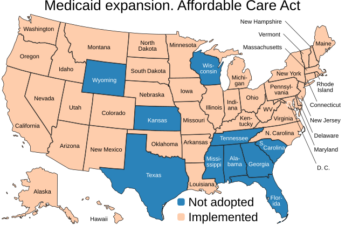by Donna Gordon Blankinship, Washington State Standard
April 4, 2025

Emma McDonnell has one of those jobs it takes a few minutes to explain. She’s a biomedical informatics researcher in the University of Washington School of Medicine. But that doesn’t really explain what she does, even if you know what informatics is. Her research is centered on making health care and medical technology accessible to people with disabilities.
Her Ph.D. and master’s degrees were in human-centered design, a field she describes as highly interdisciplinary. I just call it very cool. Human-centered design is something we didn’t know we needed until we had it. I predict the results of her research will become known to most of us someday because it is so essential. Consider the needs of the elderly, people who may not have grown up with disabilities but gain them as time goes on.
This isn’t a story celebrating McDonnell and her work. Unfortunately. This is a column about how she and other young researchers like her are wondering if they will be able to build a science career in a nation led by anti-science, anti-DEI politicians. And it’s about how that could have lasting consequences when it comes to advances in medicine and other fields.
McDonnell is considering redirecting her research focus so she can attract federal grants when her training is complete, or just moving her career in an entirely different direction.
The Trump administration has demonstrated, through executive orders and other edicts, they do not want the U.S. government to support research that focuses on diversity, equity and inclusion because those topics do not help the majority of Americans (their words, definitely not mine). Emma McDonnell is in the first year of a postdoctoral fellowship at the University of Washington School of Medicine. As the Trump administration makes cuts, she’s concerned about the future of her research, which focuses on making health care and medical technology accessible to people with disabilities. (Photo courtesy of Emma McDonnell)
McDonnell reminded me: DEI is not just about race and ethnicity, it’s also about accessibility.
She is in the first year of a two-year postdoctoral fellowship at UW, paid for by the National Library of Medicine, a division of the National Institutes of Health, a federal agency that has been ordered by the president to cut research grants. McDonnell is definitely not the only UW postdoc worried about their future right now. UW has about 450 postdocs in the School of Medicine, nearly all of them paid by dollars from the federal government.
The University of Washington is one of the top research universities in the country. This is underscored by the amount of research dollars they get from the federal government. Federal dollars make up 55% of all university research dollars nationally. UW is No. 5 nationally in its spending of this money, according to the National Science Foundation. That money pays for labs and people across the university, not just the School of Medicine.
While McDonnell is part of a national program focused on making health care more efficient, her part of the research is clearly about accessibility. Health disparities that people with disabilities face were declared a focus last year, when Joe Biden was president — and not telling NIH what to do. Now, unfortunately, that area is a target instead of a priority.
“None of us are really sure what it will look like having a career in this very important work if it’s basically banned from the top,” McDonnell told me.
The cuts have begun
The first cuts in government research dollars were around projects on gender and climate, but disability and accessibility are on the list.
Donald Trump has made it clear that he is ready to punish any university that allows students to express their First Amendment rights too vociferously. Cutting federal research dollars is one way to go about that, as the U.S. government is the main source of funds to pay for expensive labs and the people who work in them.
Columbia, the University of Pennsylvania, Harvard and Stanford have already been targeted. I expect UW, where students protested the war in Gaza for months last year, could be too. The Department of Education, in early March, included the university on a list of 60 it says were under investigation for antisemitic harassment and discrimination, warning of “potential enforcement actions.”
About 1,900 scientists, all members of the National Academies of Sciences, Engineering and Medicine, recently called the Trump administration’s research cuts a “wholesale assault on U.S. science” in an open letter, saying the cuts threaten the health and safety of Americans.
Research cuts at UW have begun around both DEI-related topics and vaccine hesitancy, according to Shelly Sakiyama-Elbert, vice dean for research and graduate education, in the University of Washington School of Medicine.
“We’re definitely concerned,” Sakiyama-Elbert said. “We’re seeing a lot of delays in rewards, in next year’s funding, without much explanation.”
She said they’ve experienced delays in both the review process and the issuing of new grants. And the termination of current grants has also begun. The process is fluid, so Sakiyama-Elbert couldn’t give an exact dollar figure for the cuts, but if you add in the research where UW is a subcontractor, the losses are already in the millions for just the School of Medicine.
The School of Medicine is also concerned about the NIH proposal to cut grants for indirect costs, which pays for research facilities and other overhead, to 15%. The current UW standard is 55.5% campus-wide, which is pretty standard nationwide. A cut like this would result in an estimated decrease of $91 million for just the School of Medicine, Sakiyama-Elbert said. That NIH proposal is tied up in the courts after Washington state and others sued to stop it.
“With so much uncertainty, we just don’t know how big the impact is going to be,” she added, noting that the toll might also be seen 10 or 20 years down the road, when needed scientific discoveries don’t materialize.
The human impact
Cutting the university’s overall research budget is a big financial concern for UW administrators, but Sakiyama-Elbert says the real worry is what will happen to young researchers like McDonnell. UW has already instituted a hiring freeze which means fewer doctoral students and postdocs will be able to get jobs in research labs.
She believes the brain drain could happen at three points in the process of training future scientists: from undergrad to graduate school when students decide to pursue a different career, from graduate school to Ph.D. programs when some future scientists will be turned away because of a lack of funding, and from postdoc to professorships when jobs may be limited.
A similar brain drain happened during the 2008-2010 recession when research money was also cut. What scientific discoveries were delayed or never happened because some postdocs never pursued their research ideas? Which medical advances will be delayed this time?
While McDonnell could pivot and work in another part of human-centered design for a few years and see if the climate for accessibility research improves, she doesn’t want to do that. She is passionate about her work and her brain is filled with ideas for future research. She also recognizes her place as a role model for other students like her.
“I identify as disabled. I want to be at a place where my disabled students feel safe,” she said. So far, the University of Washington is a place like that and has been for a long time, with a strong computer science focus on accessibility, for example.
UW is also a place where many international students come to learn and research and both McDonnell and Sakiyama-Elbert are concerned about their international colleagues.
“We’ve really benefited from having such brilliant and creative people wanting to come to the United States,” Sakiyama-Elbert said. She’s heard about potential international brain drain: American students and postdocs saying they are going to look outside the U.S. for postdoc fellowships and faculty jobs. The uncertainty is scary for these folks, she added.
Cutting federal research grants could deal a variety of hits to individuals and the Washington economy, because UW is just one place where federal dollars are fueling science, paying for construction and funding scientific research.
“My intent for myself is I’m going to save my panic for July, which is when I have to start looking for jobs,” McDonnell said.
For the rest of us, who will benefit from the research McDonnell and her colleagues do – or don’t do – the time to panic may be further off. Most people don’t realize how long it takes to develop a cure to cancer or an effective treatment for Alzheimer’s. Four years of eroding federal support could delay life-saving treatments for decades.
Washington State Standard is part of States Newsroom, a nonprofit news network supported by grants and a coalition of donors as a 501c(3) public charity. Washington State Standard maintains editorial independence. Contact Editor Bill Lucia for questions: info@washingtonstatestandard.com.


